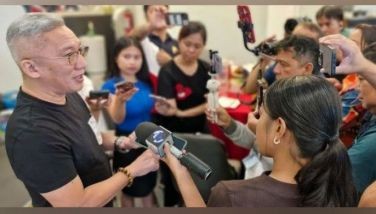Gwen mulls using tanods in anti-insurgency drive
August 25, 2006 | 12:00am
Governor Gwen Garcia has recently mulled the deputation of tanods instead of the hiring of volunteers to compose the Citizens Armed Forces Geographical Unit that would help in her all-out war against insurgency.
The governor has earlier planned to hire Cafgu volunteers to serve as an auxiliary group for the provincial anti-insurgency task force aimed at fighting and containing the insurgents in Cebu.
The provincial anti-insurgency task force, created through her Executive Order 564, is a composite of police and military forces that she herself would head, and together with it would be the auxiliary group supposedly consisting of Cafgu volunteers.
Governor Garcia, however, got an idea lately that deputizing tanods instead of using Cafgus might even be more cost efficient and effective in attaining her purpose.
The use of Cafgus would require bigger allocation for allowances and more time for training while deputizing tanods would only need enhancing their skills and knowledge for the task because they have already existing allowances to speak of.
More evaluation however is needed for this shift of plans, Garcia said, adding that she took the cue from undersecretary Melchor Rosales of the Department of Interior and Local Government during the Regional Peace and Order Council meeting in Talisay City last week.
Rosales discussed President Gloria Arroyo's recent executive order empowering the Philippine National Police to deputize tanods as "force multipliers" in enforcing the government's anti-insurgency drive.
The governor recalled telling Rosales that her anti-insurgency pronouncement was made during the RPOC meeting in Siquijor sometime last June, or two weeks ahead of the president's.
Garcia said her all-out war policy is a holistic approach to solve the insurgency problem but distinct from the traditional employment of military force.
The local peace and order council of every town and city in the province however needs to endorse the governor's plan to operate the provincial auxiliary group and the utilization of tanods for such group.
She said the provincial anti-insurgency task force laid out various aspects of her all-out war policy including those on rewards, legal, public relations, and socio-economic and livelihood projects.
The keys in her anti-insurgency drive are: to counteract the rebel's propaganda; to resolve poverty, which has spawned insurgency; and to help the operation of the military and the police while protecting civilians from rebels' foray.
Garcia meanwhile said she already requested from the Secretary of National Defense permission to set up two divisions of the provincial anti-insurgency task force-one in southern Cebu and the other in northern Cebu.
There has been no response yet on the matter, said the governor. - Cristina C. Birondo/RAE
The governor has earlier planned to hire Cafgu volunteers to serve as an auxiliary group for the provincial anti-insurgency task force aimed at fighting and containing the insurgents in Cebu.
The provincial anti-insurgency task force, created through her Executive Order 564, is a composite of police and military forces that she herself would head, and together with it would be the auxiliary group supposedly consisting of Cafgu volunteers.
Governor Garcia, however, got an idea lately that deputizing tanods instead of using Cafgus might even be more cost efficient and effective in attaining her purpose.
The use of Cafgus would require bigger allocation for allowances and more time for training while deputizing tanods would only need enhancing their skills and knowledge for the task because they have already existing allowances to speak of.
More evaluation however is needed for this shift of plans, Garcia said, adding that she took the cue from undersecretary Melchor Rosales of the Department of Interior and Local Government during the Regional Peace and Order Council meeting in Talisay City last week.
Rosales discussed President Gloria Arroyo's recent executive order empowering the Philippine National Police to deputize tanods as "force multipliers" in enforcing the government's anti-insurgency drive.
The governor recalled telling Rosales that her anti-insurgency pronouncement was made during the RPOC meeting in Siquijor sometime last June, or two weeks ahead of the president's.
Garcia said her all-out war policy is a holistic approach to solve the insurgency problem but distinct from the traditional employment of military force.
The local peace and order council of every town and city in the province however needs to endorse the governor's plan to operate the provincial auxiliary group and the utilization of tanods for such group.
She said the provincial anti-insurgency task force laid out various aspects of her all-out war policy including those on rewards, legal, public relations, and socio-economic and livelihood projects.
The keys in her anti-insurgency drive are: to counteract the rebel's propaganda; to resolve poverty, which has spawned insurgency; and to help the operation of the military and the police while protecting civilians from rebels' foray.
Garcia meanwhile said she already requested from the Secretary of National Defense permission to set up two divisions of the provincial anti-insurgency task force-one in southern Cebu and the other in northern Cebu.
There has been no response yet on the matter, said the governor. - Cristina C. Birondo/RAE
BrandSpace Articles
<
>
- Latest
- Trending
Trending
Latest


















